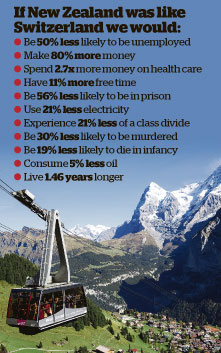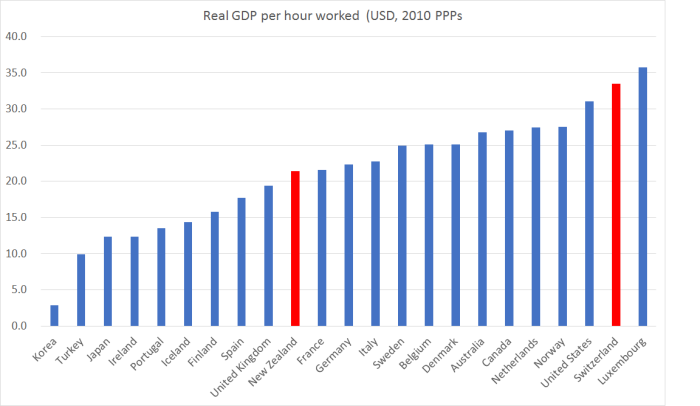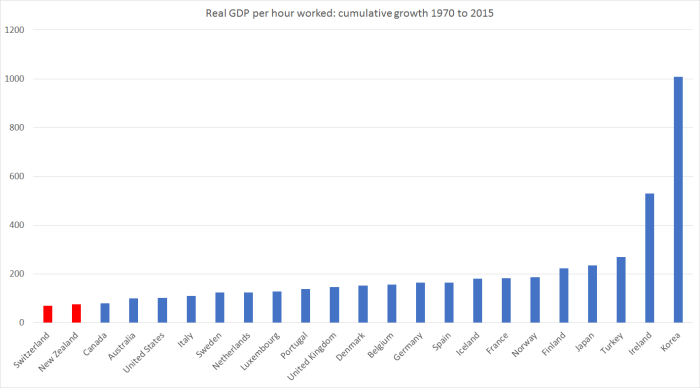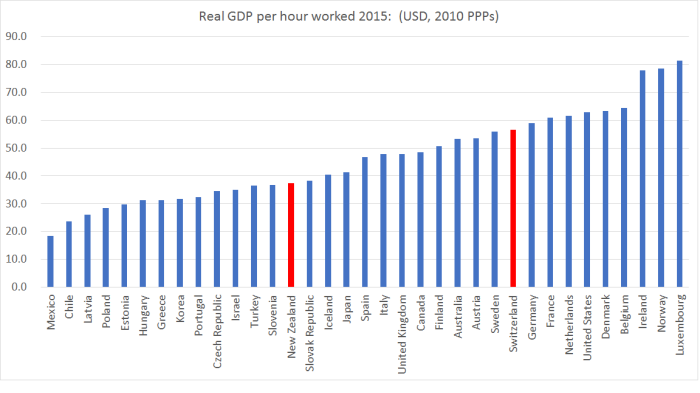Reading the Herald over lunch, I was interested to learn that the New Zealand Initiative is leading a study tour (of 40 chief executives and chairs) to Switzerland to see what we have to learn from them. According to the Herald’s account,
At the heart of a one-week study tour organised by leading think tank the New Zealand Initiative is a quest to examine the role “localism” plays in the Swiss economic success story.
The online version of the story even had a graphic,

Many of those items seem quite attractive. Nonetheless, when the story was framed around Switzerland’s economic success, I couldn’t help wondering if the Initiative’s members might not be heading to the wrong place.
Once upon a time, Switzerland had either the highest or second highest measured productivity (real GDP per hour worked) in the advanced world. The Conference Board has estimates back to 1950 – when Switzerland was just behind Luxembourg. But in this post, I’ll use OECD data, which goes back to 1970.
As recently as 1970, Switzerland still held that sort of rank (as it did for nominal GDP per hour worked – in some ways a superior measure, but good timely estimates for the current situation aren’t available). These are the OECD countries for which there is 1970 data.

We weren’t doing too badly either – just slightly below the median for example, and in the middle of the big European countries (Spain, UK, France, Germany and Italy).
But here is the cumulative growth in this measure of labour productivity for the full period 1970 to 2015.

Beaten even by New Zealand. It is a pretty woeful Swiss productivity performance. Even over the last 25 years when both countries have done a little better relatively (we beat six of the OECD countries), Switzerland still came in behind New Zealand. Over the decades, they don’t even have the excuse of agricultural protectionism, or being remote in an age when personal connections have become more important.
And what about the present? Here are the levels of real GDP per hour worked in 2015, for the now much larger OECD.

Switzerland is, of course, still a productive and prosperous economy. But over the last 45 years, it has slipped a long way down the league tables. As for us, of the countries on the first chart who had lower productivity than New Zealand in 1970, only Turkey, Portugal and Korea still do. (I hadn’t really noticed previously that if they don’t shoot themselves in the foot, even Turkey will soon go past us if these numbers are to be believed.)
I’m sure there are many good things about Switzerland. It is a much richer, and in many ways more successful, country than New Zealand. But I’m not sure I’d be looking to them, or their governance models (fascinating as they are in many respects), for lessons on what New Zealand should do to lift its relative economic and productivity performance.
Detrended swiss data is at my blog in my lost decades posts.
LikeLike
Put me out of my misery …
Until the dawn of Rogernomics NZ was a protected environment – we built things – we manufactured things – we might not have been the most efficient in the world but we made things and employed a lot of people doing so
Then it was decided we should import things that other countries were more efficient at – and it was so.
In the days since then have we established any new industries to replace those import substitution industries that closed down? What happened to all the people – all the employees – what did they do?
So what are these 40 captains of industry going to Switzerland to look at?
What industries are these captains of industry captains of?
What I can’t understand is when we close down industries and don’t replace them with anything substantial how can we be beguiled into allowing mass migration (doing what I know not) and then kidding ourselves we now need to import “smarts” to help us do something I know not what
How about showing two migration charts 1970-2015 compared to Switzerland
(a) annual intake
(b) cumulative migrant intake
LikeLike
I’ll see if I can dig out the data, but in the meantime, over that 45 years Switzerland’s population increased by around 35% and ours by around 65%.
of the european countries, Ireland, Iceland and Luxembourg have had broadly similar population growth rates to NZ over that period.
LikeLike
I guess Turkey does not count the 4 million refugees which it uses as slave labour and are not considered as people to be counted but they will likely include the several billion Euros they get from the EU to make this refugee problem go away.
LikeLike
I think the most interesting chart on this post is the cumulative growth 1970 to 2015.
If you adjust our performance for distance factor then we would be well up the pack, in fact this chart belies all the doom and gloom mongers. Look who we are next to, Australia, the USA , Canada, Italy Sweden.
That’s pretty good in my book.
But you are right Michael, why would we want to compare ourselves to Switzerland.? You neglected to mention in your analysis that Switzerland is generally held to be the most boring country on earth!
Cant say that about good ole NZ!
LikeLike
What an interesting article. As usual your style is phlegmatic but on the comparison with Switzerland graphic you wrote “Many of those items seem quite attractive”. I’m retired so we live on my wife’s income but if she received an 80% pay rise and we had about 3 times better healthcare and 11% more free time we would be hanging out the flags and jumping up and down with joy.
Being unable to cut and paste from the graphic I discovered this site that compares NZ with other countries: http://www.ifitweremyhome.com/compare/NZ/GB which I suspect is the origin of the statistics in the graphic. It also gives a quite interesting comparison with my own country of origin the UK and I recommend the comparison with PNG especially the superimposed maps.
LikeLike
Thanks. As I said, I’m sure Switzerland has lots to commend it in many ways. But i do recall spending 6 weeks there on a course many years ago, and being reminded that i quite enjoyed the freedom to mow my lawn when i wanted to, not when the local council permitted it!
Sadly, it also brings to mind a comment our central bank handler made about housing in Switzerland. At the time, she said, only quite senior Swiss central bank people would own their own home. At the time, it was shocking (esp as at our cenrtral bank we still had concessional mortgages) but the sad thing now is that housing affordability in NZ is going much the same way. And in a country with so much land, it is so unncessary.
LikeLike
Averages are a problem when nobody is average. I mention the ten times greater probability of being murdered in PNG to my sister-in-law and she said “it depends on what you do”. Similarly the UK stats seem very slightly better than NZ but I know where I greatly prefer living.
LikeLike
I spend a bit of time for work in Switzerland each year. One observation I have is that they live far more densely in their cities. And their infrastructure connections are far more advanced. Express trains intercity every 10-15 minutes is one example. They only have about twice our population, but in Bern where I visit most are “housed” in 4-5 story apartment buildings. I guess that the infrastructure spend to support this density is “cheaper” than what we battle with in NZ. Perhaps we need a doubling of the population to get better bang for our buck? As long as they don’t all settle in Auckland.
LikeLike
There would still be the question of what the next 4.7m people would do to earn a high standard of living in competitive world (which has been, more or less, our problem for the most recent couple of million people we added).
Switzerland has a pretty favourable location. It makes sense that people would congregate there – and in France, Germany, Belgium, northern Italy etc. That is a less obvious proposition here.
LikeLike
The 137,000 extra employed in the past year is a good start. Many in construction. The point I was trying to make was that our infrastructure is pretty woeful – too few people trying to have a first world delivery of transport, hospitals, schools etc. Not enough people to pay for it. With more dense housing we would create construction jobs, lower infrastructure costs per head and boost overall economic activity. I agree that our relative isolation handicaps us economically, but all the more reason to build domestic capacity to consume and grow.
LikeLike
Yes, and I take the point about NZ infrastructure. My one experience of Switzerland was a six week course there, which was pretty undemanding, It is was held at a conference centre in the countryside outside Bern, and I found it was easy enough to get the train into Bern and back any time I wanted to buy English newspapers (this was pre-internet). Couldn’t manage that here.
But my point isn’t negated by employment growth. Bring in lots of people and the demand they create will create jobs in the short-term (building houses and roads etc). But we only get rich and prosperous by finding ideas and products we can successfully sell to the rest of the world. We’ve been failing at that (not increasing the export share of GDP, or even seeing it shrinking, for decades), and unless we can turn that round, prospects for per capita income growth here aren’t good. As a reminder, we have had no labour productivity growth at all in the last 4 or 5 years.
LikeLike
But even if one doesn’t have bright ideas on innovative (exports) productivity, cannot one can still prosper wealth creatively by a ceaseless, systematic capital savings rate within one’s income for – even only modestly profitable investment ?
Is it not an irrefutable reality that without saving and investment, wealth creation beyond hand-to-mouth consumption is physically impossible, and there would not be even any capital in existence for borrowing or lending ?
LikeLike
Yes, saving today can be a basis for increased income tomorrow (not necessarily much higher at the sorts of interest rates the world has today). Swiss have tended to save quite substantially – more than they need for today’s investment – so have a large net stock of foreign assets, allowing them to increase consumption in future beyond just what their productivity would justify. Having said that, the savings strategy really only tends to work for countries with ,eg, huge reserves of oil relative to population. Otherwise, prosperity really depends on ideas, innovation, really skilled people etc.
On your second para, I think the conceptual answer to your question is “yes”. After all, time spent coming with smart ideas is time not spent producing stuff today which one could consume from. Typical OECD countries these days have savings and investment rates (as a share of GDP) of a bit above 20%. Much of that covers the depreciation on existing capital. In any particular year net savings (net of depreciation) won’t necessarily be positive – one can use some other country’s saving (eg a large current account deficit) but over time all countries tend to have positive net savings and investment rates.
LikeLike